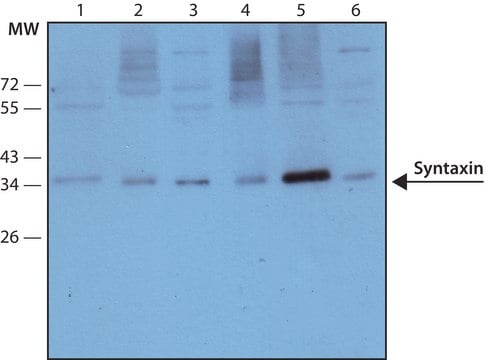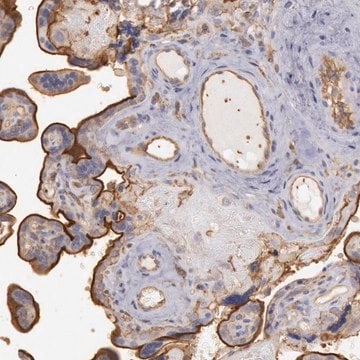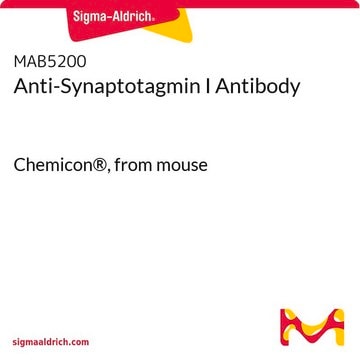MAB333
Anti-Synaptobrevin Antibody, clone SP10
ascites fluid, clone SP10, Chemicon®
Synonym(s):
VAMP
Sign Into View Organizational & Contract Pricing
All Photos(1)
About This Item
UNSPSC Code:
12352203
eCl@ss:
32160702
NACRES:
NA.41
Recommended Products
biological source
mouse
Quality Level
antibody form
ascites fluid
antibody product type
primary antibodies
clone
SP10, monoclonal
species reactivity
rat, hamster, salamander, pig, human
manufacturer/tradename
Chemicon®
technique(s)
immunohistochemistry: suitable
western blot: suitable
isotype
IgM
NCBI accession no.
UniProt accession no.
shipped in
wet ice
target post-translational modification
unmodified
Gene Information
human ... VAMP1(6843)
Specificity
Synaptobrevin [VAMP]. MAB333 reacts with VAMP-1 and VAMP-2 fusion protein expressed in bacterial system.
Immunogen
Crude synaptic immunoprecipitate (Human).
Application
Anti-Synaptobrevin Antibody, clone SP10 is an antibody against Synaptobrevin for use in WB, IH.
Immunohistochemistry at >1:25.
Western blotting at 1:100-1:10,000.
Optimal working dilutions must be determined by the end user.
Western blotting at 1:100-1:10,000.
Optimal working dilutions must be determined by the end user.
Research Category
Neuroscience
Neuroscience
Research Sub Category
Synapse & Synaptic Biology
Synapse & Synaptic Biology
Linkage
Replaces: AB5863P
Physical form
Liquid, contains sodium azide.
Storage and Stability
Maintain frozen at -20°C in undiluted aliquots for up to 12 months. Avoid repeated freeze/thaw cycles.
Legal Information
CHEMICON is a registered trademark of Merck KGaA, Darmstadt, Germany
Disclaimer
Unless otherwise stated in our catalog or other company documentation accompanying the product(s), our products are intended for research use only and are not to be used for any other purpose, which includes but is not limited to, unauthorized commercial uses, in vitro diagnostic uses, ex vivo or in vivo therapeutic uses or any type of consumption or application to humans or animals.
Not finding the right product?
Try our Product Selector Tool.
Storage Class Code
10 - Combustible liquids
Certificates of Analysis (COA)
Search for Certificates of Analysis (COA) by entering the products Lot/Batch Number. Lot and Batch Numbers can be found on a product’s label following the words ‘Lot’ or ‘Batch’.
Already Own This Product?
Find documentation for the products that you have recently purchased in the Document Library.
Huayu Qi et al.
Molecular biology of the cell, 13(2), 530-541 (2002-02-21)
The zona pellucida (ZP) is a highly organized extracellular coat that surrounds all mammalian eggs. The mouse egg ZP is composed of three glycoproteins, called mZP1-3, that are synthesized, secreted, and assembled into a ZP exclusively by growing oocytes. Here
G Bonanno et al.
British journal of pharmacology, 129(8), 1780-1786 (2000-04-26)
The release of [(3)H]-dopamine ([(3)H]-DA) from human neocortex nerve terminals was studied in synaptosomes prepared from brain specimens removed in neurosurgery and exposed during superfusion to different releasing stimuli. Treatment with 15 mM KCl, 100 microM 4-aminopyridine, 1 microM ionomycin
M Raiteri et al.
Journal of neurochemistry, 74(1), 423-431 (2000-01-05)
Small molecules present during brain tissue homogenization are known to be entrapped within subsequently isolated synaptosomes. We have revisited this technique in view of its systematic utilization to incorporate into nerve endings impermeant probes of large size. Rat neocortical synaptosomes
Elizabeth Scarr et al.
Clinical psychopharmacology and neuroscience : the official scientific journal of the Korean College of Neuropsychopharmacology, 10(1), 25-33 (2013-02-23)
Given the ability of mood stabilizers and antipsychotics to promote cell proliferation, we wanted to determine the effects of these drugs on neuronal markers previously reported to be altered in subjects with psychiatric disorders. Male Sprauge-Dawley rats were treated with
Richard Henriksson et al.
Synapse (New York, N.Y.), 62(11), 829-833 (2008-08-23)
Convergent lines of evidence suggest potentiation of glutamatergic synapses after chronic ethanol exposure, and indicate that the presynaptic effect hereof is on modulators of synaptic strength rather than on executors of glutamate release. To address this hypothesis in the context
Our team of scientists has experience in all areas of research including Life Science, Material Science, Chemical Synthesis, Chromatography, Analytical and many others.
Contact Technical Service








